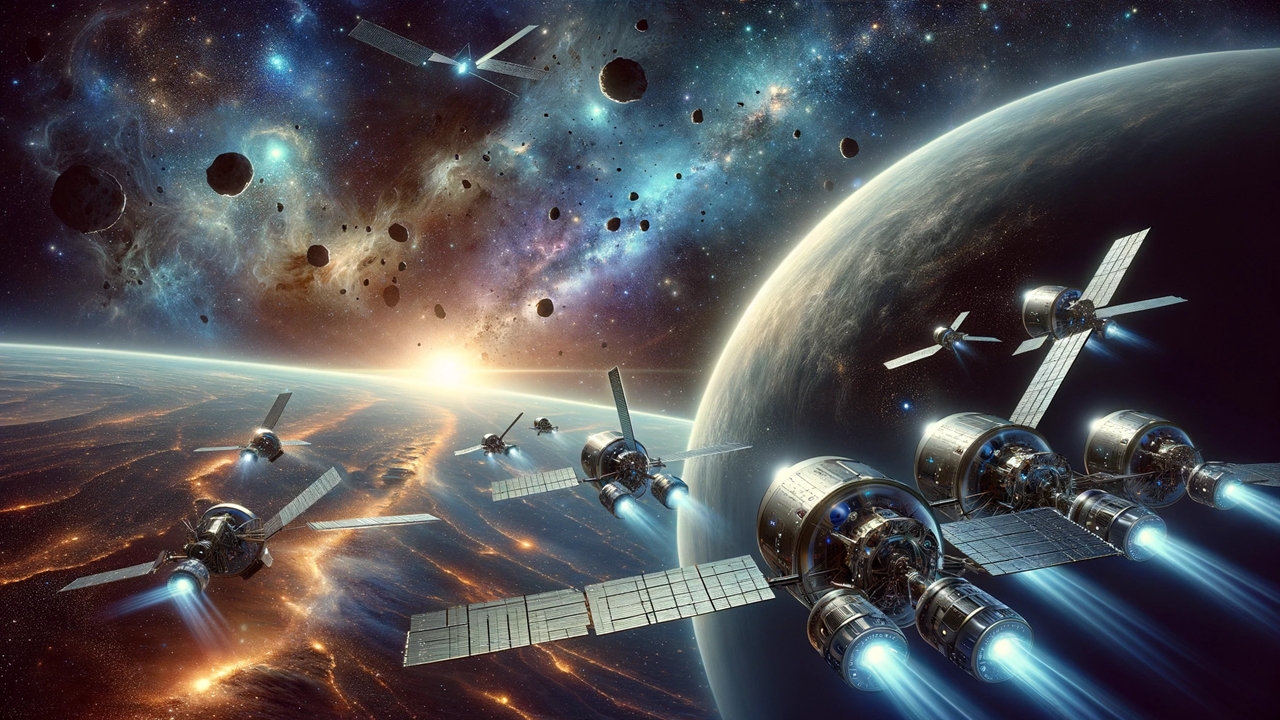Navigating the Cosmos: AI-Powered Voyagers Transforming Space Exploration
In the vast and uncharted expanse of space, Artificial Intelligence (AI) is revolutionizing the way we explore the cosmos. Autonomous rovers and satellites, empowered by AI, are now the vanguards of deep space missions, making discoveries beyond human reach. This article delves into the intricacies of AI in space exploration, spotlighting the groundbreaking advancements and the potential they hold for unlocking the universe's secrets.

The final frontier has always beckoned humanity with its silent allure, a vast expanse filled with mysteries awaiting discovery. Yet, the vast distances and harsh conditions of space present formidable challenges that often exceed human limits. This is where Artificial Intelligence (AI) steps in, heralding a new era in space exploration. Through autonomous rovers and satellites, AI is not just an assistant but a pioneer, navigating the cosmos with unprecedented efficiency and resilience.
The Vanguard of Discovery: Autonomous Rovers
On the dusty plains of Mars and the icy crusts of distant moons, autonomous rovers are at the forefront of interplanetary exploration. These robotic emissaries, equipped with AI, can navigate treacherous terrains, analyze geological formations, and search for signs of life—all without direct human intervention. The Mars Rover Perseverance, for example, showcases the zenith of AI's capabilities in space exploration. Using a suite of sophisticated instruments and algorithms, it can make real-time decisions, selecting which paths to traverse or which rocks to study, optimizing its mission objectives with a level of autonomy that was unthinkable just a decade ago.
This autonomy is crucial for exploring environments that are beyond human reach, either due to distance, cost, or the sheer inhospitality of alien landscapes. AI-driven rovers can adapt to their surroundings, learning from obstacles and efficiently managing their energy resources. This adaptability extends the mission's lifespan and enhances the scientific return, providing insights into the solar system's history and the potential habitability of other planets.
Eyes in the Sky: AI-Enabled Satellites
Beyond the surface of planets and moons, AI plays a pivotal role in the operation of satellites orbiting Earth and beyond. These advanced machines, equipped with AI algorithms, can process vast amounts of data from space, from tracking hurricanes to monitoring climate change and beyond. The ability to analyze and transmit this data in real time is vital for both scientific research and practical applications on Earth.
In deep space, satellites equipped with AI technologies are pushing the boundaries of what we can observe. They autonomously manage their operations, from adjusting their orbits to optimizing the collection of astronomical data. This self-sufficiency is crucial for missions that venture far from Earth, where communication delays can make real-time human oversight impractical.
Machine Learning: Deciphering the Cosmos
At the heart of AI's success in space exploration is machine learning, a branch of AI that allows computers to learn from and make decisions based on data. This capability is transforming how we analyze the universe. Machine learning algorithms can sift through the deluge of data from telescopes and space missions, identifying patterns and anomalies that would be impossible for humans to find unaided. This has led to the discovery of new celestial bodies, the mapping of cosmic phenomena, and a deeper understanding of the cosmos.
For instance, machine learning techniques are being used to detect exoplanets from the faint dips in starlight they cause as they pass in front of their host stars. This method has exponentially increased the number of known exoplanets, expanding our knowledge of planetary systems beyond our own.
Challenges and Future Horizons
Despite these advancements, integrating AI into space exploration is not without its challenges. The harsh space environment can be unforgiving, with extreme temperatures, radiation, and the vacuum of space testing the limits of technology. Ensuring the reliability and durability of AI systems in these conditions is a constant battle.
Moreover, the ethical implications of autonomous systems in space exploration cannot be ignored. As AI assumes more decision-making roles, the question of accountability and control becomes more pressing. Balancing the benefits of autonomy with the need for human oversight is a delicate task that will define the future trajectory of space exploration.
Conclusion: A New Era of Cosmic Discovery
As we stand on the brink of a new era in space exploration, the role of AI is undeniable. Autonomous rovers and satellites have become indispensable tools in our quest to understand the universe. They extend our reach, enhance our capabilities, and open new avenues for discovery that were once beyond imagination.
Looking ahead, the integration of AI in space exploration will only deepen, with potential applications ranging from autonomous spacecraft repairing satellites in orbit to AI-driven habitats on other planets. The journey into space, once propelled by rockets and human courage, is now being navigated by the invisible hand of artificial intelligence, guiding us into the unknown with the promise of uncovering the universe's oldest secrets. In this grand adventure, AI is not just a tool but a companion, transforming the silent void of space into a realm of endless possibility.










